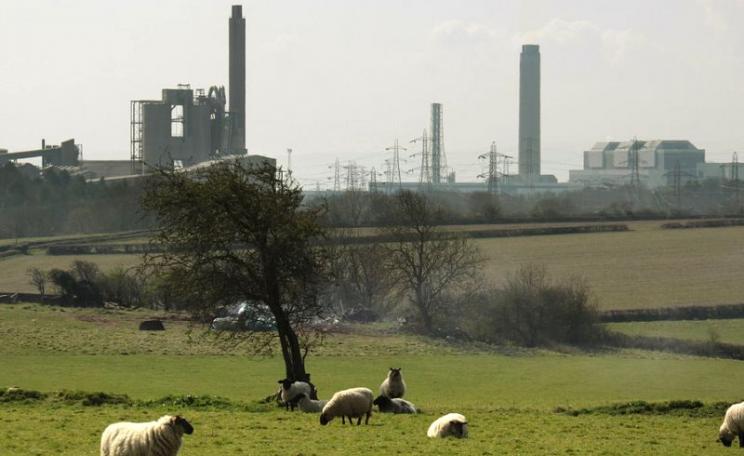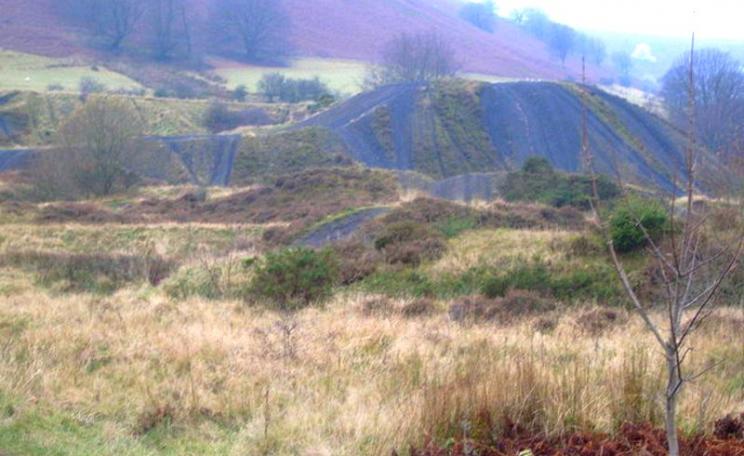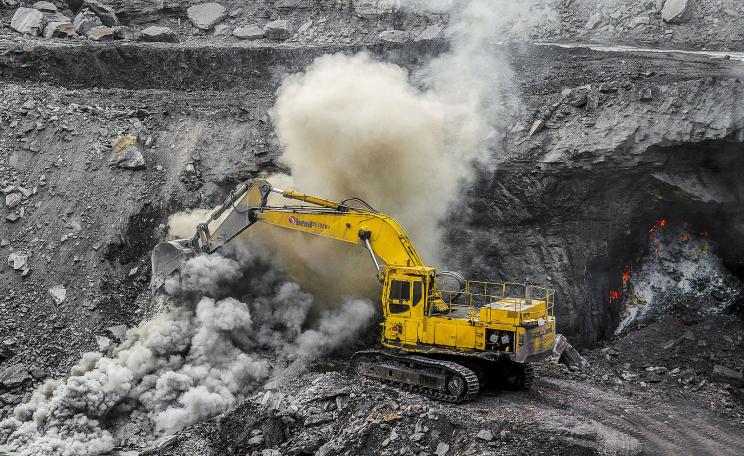There was going to be public amenity, there was going to be houses - but what we're going to inherit is a large hole in the ground
Campaigners in Wales are celebrating the refusal of a coal mine extension - but are in despair that restoration repeatedly promised to them in return for putting up with noise and dust from the open cast coal mine might never happen.
Councillors at Merthyr Tydfil County Borough Council have voted unanimously to refuse planning permission for the expansion of the Ffos-y-Fran coal mine, a 400ha open cast coal mine 1.5km from the town centre of Merthyr Tydfil.
The mine contains dry steam coal, which is suited to steel manufacturing rather than power generation, and is mostly sold to the TATA Steel plant at nearby Port Talbot. It was originally granted permission in 2005, but this was amended in 2011 along with a condition that all coal extraction from the development was to cease no later than 6 September 2022, with final restoration of the land to be completed by 6 December 2024.
However, last year operator Merthyr South Wales applied to extend coaling to March 2024, and to move the restoration deadline to June 2026, which would allow the 240,000 tonnes of coal remaining in the mine to be extracted.
New or expanded coal mines are effectively banned via Welsh Government planning policy issued in 2018, except in “wholly exceptional circumstances”. The mine operator claimed that it met that test because TATA Steel needed more coal supplied domestically due to global market disruption, and that it needed time to submit a new planning application for alternative restoration plans.
It also claimed that working practices put in place due to COVID-19 had reduced the amount it had extracted by more than 300,000 tonnes.
Lack of evidence
Council planners roundly dismissed the company’s arguments. The company had not submitted any evidence to back its claims that TATA Steel needed the coal, nor that emissions from importing supplies from other countries would result in carbon emissions that were five times higher than using that produced domestically, according to the planning officers’ report.
Plans for a future application about the site’s restoration were no more than “embryonic” and lacked detail, and therefore could not be considered now, it said.
Daniel Therkelsen from campaign group Coal Action Network said: “We're celebrating this decision with the local residents who have fought against this opencast coal mine on their doorsteps for over 16 years.”
"This is a strong and clear message that coal mining goes against Wales’ climate, planning and coal policies and sets a strong precedent,” said Friends of the Earth Cymru director Haf Elgar.
Enforcement
However, the campaigners’ fight is not over. Firstly, they want the council to take enforcement action against the company, which has continued mining coal in the months since its planning permission expired in September 2022.
There was going to be public amenity, there was going to be houses - but what we're going to inherit is a large hole in the ground
Local people have witnessed coal being loaded onto lorries at the site. Austin says: “The activity can't be missed, it's right alongside the main road. The council has the legal right to enforce action on them from day one, but they chose not to.”
Indeed, data from the Coal Authority state that production from October – December was 102,505 tonnes, compared with an average output of 150,101 tonnes between January and June, when the planning permission was still valid.
The council admitted to being aware of activity at the mine since the permission expired, but had believed the mine operator’s claim that the work was needed to remove a landslip in August last year in an email from its principal planning officer David Cross seen by The Ecologist.
After CAN brought the Coal Authority data to the council’s attention, the council said it would decide whether to take enforcement action once the planning application had been decided by the planning committee.
The issue was brought up by councillors at the planning meeting. Cross responded that internal meetings would discuss enforcement options, but did not provide any timescale for this.
A spokesperson for Merthyr Tydfil council said: “The Council is currently reviewing appropriate enforcement action. We remain open to any discussion with the mine operator for a revised restoration strategy of the site, in light of the insufficient funds reported in the planning application.”
Campaigners are frustrated that the extra eight months of coaling since the planning permission expired has effectively given Merthyr South Wales an eight month extension to its operation. Therkelson said that campaigners would scrutinise the council’s enforcement, and would consider legal action if action did not rapidly follow.
Broken promises
Restoration of the mine site has been estimated by the council at £75-£125 million. Merthyr (South Wales) Ltd has openly admitted that it does not have sufficient funds to restore the site.
The company is legally obliged to pay into a fund managed by the council, known as an escrow account, which would pay for the restoration of the site if the company defaulted. The current value of the fund is £15 million.
Its planning application states: “As the council is fully aware, there are insufficient funds within the escrow and restoration fund to allow for the full and successful implementation of the current restoration strategy for the site.”
Local campaigner and resident Chris Austin, from United Valleys Action Group (UVAG) said: “£15 million will probably just about put a path round it, and a couple of fences and some signs."
Councillor Kevin Gibbs told the planning committee meeting that the council was really worried the site would be left as a hole in the ground, pointing out that the company has had 16 years to set aside funds for this restoration.
Local people are extremely sceptical that any restoration of the mine site will take place. Austin points to the irony that the operators have always insisted that the mine was not referred to as such, but rather the “Ffos Y Fran Land Reclamation Scheme”. The name appears on all official paperwork, as well as signs at the site.
“Every time we called it an open cast coal mine, they would jump up and down and point fingers at us and shout that this wasn't an open cast coal mine, this was "land reclamation". There was going to be public amenity, there was going to be houses, there was going to be this, there was going to be that - but what we're going to inherit is a large hole in the ground,” he said.
Precedent
The fears are grounded in precedent. Restoration of several open cast coal mines in Wales and Scotland have been downgraded or not completed due to the failure of coal mining companies to provide sufficient funding.
The problem is rooted in the way nationalisation of coal mines was incentivised by John Major’s Conservative government, whereby private companies were given a 10-year reprieve from having to pay into a restoration fund in exchange for paying a higher upfront price for a mine. Mining companies began to rely on income from mining extensions to pay for the restoration of old mining, according to a report by CAN.
Several companies declared bankruptcy, leaving unrestored mines behind, including Dynant Fach Colliery Company, Scottish Coal Ltd and HM Project Developments. Others exploited legal loopholes to avoid restoration costs - one such case saw the Serious Fraud Office take mine operator Celtic Energy to court for evading the restoration of East Pit mine in Neath Port Talbot by setting up a shell company in the British Virgin Islands that owned no assets. However, the judge ruled that the actions, though dishonest, were not illegal.
In the case of Ffos-y-Fran, the mining company has a record of trying to avoid paying for the restoration. In 2018, Merthyr Tydfil council had to take the company - then known as Blackstone - to court after it failed to pay into the escrow account following a company restructure.
No compensation
The application to extend the mine’s operations contained no details of the Merthyr South Wales’ financial situation in terms of what money it had set aside for restoration on top of the £15 million in the escrow account, the planning officers’ report noted.
According to the council, the company also said that it was not planning to supplement the escrow account as part of its planning application, but had offered to pay £1 per tonne of coal extracted into a Community Fund. However, officers calculated that the coal extracted since its planning permission expired amounts to nearly 200,000 tonnes, leaving just 40,000 tonnes left in the ground. Such a small sum could not compensate for the negative impacts of the mining, it concluded.
Therkelson noted that the original application was rejected by the local council, but that the Welsh Government (then the National Assembly for Wales) overruled this decision primarily on the basis that the benefits from restoring the site would compensate for the harm caused by the coal mining.
If the mining company fails to restore the site, the Welsh Government had a responsibility to step in with funding to pay for it, alongside the council, he said. The mine’s workers should be given a universal basic income to help them transition to more sustainable industries, he said.
Austin noted that coal had been trading at windfall prices since the end of 2021, reaching an all-time high of £378 a tonne, compared with around £45 a tonne during and before the pandemic. This would have allowed the company to reclaim much of the income it lost during COVID-19 restrictions, he said.
Fate
The decision on Ffos-y-fran is not the end of coal mining in Wales. Two more decisions are pending that will determine the fate of one of the nation’s most famous exports.
In March, the Cardiff High Court heard a judicial review against the expansion of the Aberpergwm deep pit mine just south of the Brecon Beacons national park that would allow it to extract around 40 million tonnes of coal.
A licence to extract the extra coal had been approved by the Coal Authority in January 2022. Barristers for CAN argued that the Welsh Government had the right to overturn this decision, but the Welsh government said its hands were tied, because the decision to go ahead with the extraction was made before it held this power.
Meanwhile, the operator of the last of the three remaining operational mines in Wales, Glan Lash in Carmarthenshire, has applied for permission to expand the mine by nearly seven hectares and extract a further 95,038 tonnes of coal – a greater amount than is permitted under the existing licence. The council is expected to decide the application this summer, after a delay of several months when it requested more information from the operator.
Restoration of the mine site is again an issue. The original planning permission said that restoration should be complete by the end of 2017, but operator Bryn Bach Coal applied for permission to extend the deadline.
Its planning application for the extension states that it would enable the full restoration of both the existing site and the new section of mine, leaving restoration dependent on gaining permission for the extension.
Haf Elgar, director of Friends of the Earth Cymru, said: “It’s been clear for years now that the coal industry in Wales is coming to an end. And in the past five years we’ve had strong statements from the Welsh Government that further fossil fuel extraction isn’t compatible with our climate change targets. This has been backed up by planning and coal policy which made it clear there should be no more coal mined in Wales.”
Gareth Clubb, director of WWF Cymru, said: “For Ffos-y-Fran, the focus must now be on restoring the site and giving something back to the community that has suffered years of harm from noise pollution, air pollution and coal dust.
“We are calling for renewed commitment from the mine operator that they will honour their duty to restore this huge blight on the landscape of Merthyr Tydfil. It would be unconscionable for the operator to add an abandoned pit to this bitter legacy”.
Merthyr South Wales did not respond to a request for comment for this article.
This Author
Catherine Early is a freelance environmental journalist and chief reporter for The Ecologist. She tweets at @Cat_Early76.







